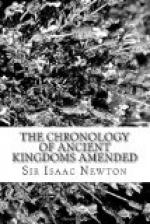I beheld the sun when it shined, or the moon walking
in brightness, and my heart hath been secretly inticed,
or my mouth hath kissed my hand, this also were an
iniquity to be punished by the judge: for I should
have denied the God that is above: and there
being no dispute between Job and his friends
about these matters, it may be presumed that they
also with their countrymen were of the same religion.
Melchizedek was a Priest of the most high God,
and Abraham voluntarily paid tythes to him;
which he would scarce have done had they not been
of one and the same religion. The first inhabitants
of the land of Canaan seem also to have been
originally of the same religion, and to have continued
in it ’till the death of Noah, and the
days of Abraham; for Jerusalem was anciently
[234] called Jebus, and its people Jebusites,
and Melchizedek was their Priest and King:
these nations revolted therefore after the days of
Melchizedek to the worship of false Gods; as
did also the posterity of Ismael, Esau,
Moab, Ammon, and that of Abraham
by Keturah: and the Israelites
themselves were very apt to revolt: and one reason
why Terah went from Ur of the Chaldees
to Haran in his way to the land of Canaan;
and why Abraham afterward left Haran,
and went into the land of Canaan, might be
to avoid the worship of false Gods, which in their
days began in Chaldea, and spread every way
from thence; but did not yet reach into the land of
Canaan. Several of the laws and precepts
in which this primitive religion consisted are mentioned
in the book of Job, chap. i. ver. 5, and chap,
xxxi, viz. not to blaspheme God, nor to worship
the Sun or Moon, nor to kill, nor steal, nor to commit
adultery, nor trust in riches, nor oppress the poor
or fatherless, nor curse your enemies, nor rejoyce
at their misfortunes: but to be friendly, and
hospitable and merciful, and to relieve the poor and
needy, and to set up Judges. This was the
morality and religion of the first ages, still called
by the Jews, The precepts of the sons of
Noah__: this was the religion of Moses
and the Prophets, comprehended in the two great commandments,
of loving the Lord our God with all our heart and
soul and mind, and our neighbour as our selves:
this was the religion enjoyned by Moses to the
uncircumcised stranger within the gates of Israel,
as well as to the Israelites: and this
is the primitive religion of both Jews and
Christians, and ought to be the standing religion
of all nations, it being for the honour of God, and
good of mankind: and Moses adds the precept
of being merciful even to brute beasts, so as not
to suck out their blood, nor to cut off their flesh
alive with the blood in it, nor to kill them for the




